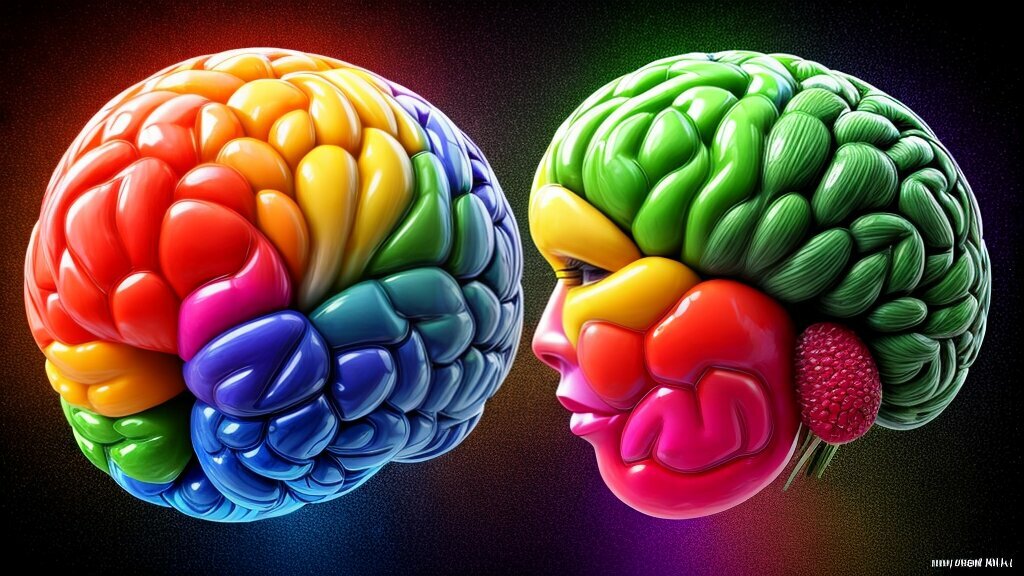Welcome to the world of nutritional neuroscience, where we delve into the impact of nutrition on brain function. Our brains are complex systems that rely on a wide range of nutrients to function optimally. By understanding the relationship between nutrition and brain health, we can take proactive steps to enhance our cognitive abilities and lead healthier, more fulfilling lives.
Recent research has shed light on the vital role that nutrition plays in brain health. Nutritional neuroscience is a rapidly evolving field that has provided us with evidence-based techniques and strategies for optimizing brain function through nutrition. In this article, we will explore the latest research and practical tips for enhancing cognitive abilities through dietary modifications.
Key Takeaways:
- Nutritional neuroscience explores the impact of nutrition on brain function
- The brain relies on a wide range of nutrients to function optimally
- Research has provided evidence-based techniques for enhancing brain function through nutrition
- By understanding the relationship between nutrition and brain health, we can take proactive steps to optimize cognitive abilities
Understanding the Relationship Between Nutrition and Brain Health
Have you ever experienced mental fog or difficulty concentrating after a heavy meal? Or found yourself feeling more energetic and focused after eating a nutrient-dense meal? These experiences highlight the critical relationship between nutrition and brain health.
Research has consistently shown that the food we consume can have a direct impact on cognitive function. In fact, the brain is one of the most metabolically active organs in the body and requires a constant supply of nutrients to function optimally.
Several key nutrients, such as omega-3 fatty acids and antioxidants, have been linked with improved cognitive function. Conversely, diets high in saturated and trans fats have been associated with poorer cognitive performance.
Furthermore, the impact of diet on brain health extends beyond short-term performance. A growing body of research suggests that the food we consume can impact brain development and even influence the risk of neurological conditions such as dementia.
The Impact of Nutrition on Cognitive Function
It is well established that nutrition plays a crucial role in maintaining cognitive function throughout the lifespan. A diet high in fruits, vegetables, whole grains, and lean proteins has been associated with improved cognitive performance and a reduced risk of cognitive decline.
In contrast, diets high in saturated and trans fats, added sugars, and processed foods have been linked with poorer cognitive function and an increased risk of cognitive decline.
In addition to individual nutrients, dietary patterns, such as the Mediterranean diet, have also been associated with improved brain health. The Mediterranean diet emphasizes whole, minimally processed foods and is rich in healthy fats, lean proteins, and complex carbohydrates.
The Relationship Between Nutrition and Brain Development
Research has demonstrated that proper nutrition during early life plays a critical role in brain development. In particular, certain nutrients, such as choline and essential fatty acids, are essential for the development of brain cells and neural connections.
Conversely, inadequate nutrition during early life can have lasting effects on brain development and function. Malnutrition, in particular, can lead to structural and functional changes in the brain, which can impact cognitive function and increase the risk of neurological conditions later in life.
Therefore, ensuring proper nutrition during early life is crucial for optimal brain development and long-term cognitive health.

Conclusion
In conclusion, the relationship between nutrition and brain health is complex and multifaceted. The food we consume can impact cognitive function, brain development, and the risk of neurological conditions such as dementia.
To optimize brain health and cognitive function, it is essential to consume a nutrient-dense diet rich in whole, minimally processed foods. By prioritizing nutrition and making informed dietary choices, you can unlock the full potential of your brain and lead a healthier, more fulfilling life.
The Role of Nutritional Interventions for Brain Health
The relationship between nutrition and cognitive health has been the subject of extensive research. Numerous studies have highlighted the critical role of specific nutrients in promoting brain function and warding off cognitive decline. By incorporating nutritional interventions into your diet, you can unlock your full cognitive potential and optimize brain health.
The nutrients that have been linked to brain health include omega-3 fatty acids, B vitamins, and antioxidants. Omega-3 fatty acids, found in fatty fish like salmon and nuts like walnuts, have been shown to improve cognitive function and reduce the risk of neurodegenerative diseases. B vitamins, found in leafy greens and whole grains, are crucial for brain development and have been linked to better memory and concentration. Antioxidants, found in fruits and vegetables, help protect the brain from oxidative stress and inflammation, which have been linked to cognitive decline.
| Nutrient | Food Sources |
|---|---|
| Omega-3 Fatty Acids | Fatty Fish (Salmon), Nuts (Walnuts) |
| B Vitamins | Leafy Greens, Whole Grains |
| Antioxidants | Fruits, Vegetables |
In addition to incorporating these nutrients into your diet, other dietary habits can help promote brain health. Research suggests that a diet rich in whole foods and low in processed foods can improve cognitive function. Furthermore, there is evidence to suggest that intermittent fasting may improve brain function and reduce the risk of neurodegenerative diseases.
Combining these dietary modifications with other lifestyle changes, such as regular exercise and stress management, can further enhance brain health. By taking a holistic approach to brain health, you can optimize your cognitive abilities and lead a healthier, more fulfilling life.

The Impact of Diet on Brain Function
Your diet has a direct impact on your brain function. Certain foods can enhance cognitive abilities, while others can impair them. A study conducted by the University of Oxford found that a Mediterranean-style diet, rich in fruits, vegetables, whole grains, and lean protein, can improve cognitive function in older adults. On the other hand, a diet high in processed foods, sugar, and saturated fat has been linked to cognitive decline and an increased risk of dementia.
One specific nutrient that has been shown to positively impact brain function is omega-3 fatty acids. These essential fatty acids are found in oily fish, such as salmon and mackerel, as well as in flaxseed, chia seeds, and walnuts. Research has linked omega-3 fatty acids to improved cognitive function, memory, and mood.
In contrast, a diet high in saturated fat, found in foods such as butter, cheese, and fatty meats, can negatively impact brain function. A study published in the journal Neurology found that individuals who consumed a diet high in saturated fat had worse cognitive function and memory compared to those who followed a diet low in saturated fat.
Overall, it is important to be mindful of the foods you consume and how they impact your brain health. Incorporating a balanced diet, rich in whole foods and healthy fats, can help to optimize cognitive function and support overall brain health.

Latest Research and Evidence on Brain Health and Nutrition
Research has shown that nutrition plays a crucial role in maintaining optimal brain function. In fact, certain nutrients have been found to have a significant impact on cognitive abilities, affecting memory, attention, and overall brain health.
One such nutrient is omega-3 fatty acids, found in fish, nuts, and seeds. Studies have found that omega-3s play a crucial role in brain development and cognitive function, improving memory and reducing the risk of cognitive decline.
| Nutrient | Food Sources | Impact on Cognitive Function |
|---|---|---|
| Omega-3 fatty acids | Fish, nuts, seeds | Improves memory, reduces risk of cognitive decline |
| Antioxidants | Berries, dark chocolate, green tea | Protects brain cells from damage and improves memory |
| B-vitamins | Whole grains, legumes, leafy greens | Improves cognitive function and reduces risk of cognitive decline |
Antioxidants, found in berries, dark chocolate, and green tea, are another group of nutrients that have been shown to protect brain cells from damage and improve memory.
B-vitamins, found in whole grains, legumes, and leafy greens, have also been found to improve cognitive function and reduce the risk of cognitive decline.
Overall, research continues to highlight the importance of nutrition for optimizing brain health. By incorporating specific nutrients into your diet, you can enhance cognitive function and protect against cognitive impairment.

Best Practices for Optimizing Brain Health Through Nutrition
Now that you understand the critical role of nutrition in brain health, it’s time to implement evidence-based techniques and strategies to optimize your cognitive function. Here are some best practices to consider:
1. Follow a Balanced Diet
Consuming a balanced diet that includes a variety of nutrient-dense foods is essential for optimal brain health. Consider incorporating whole grains, lean protein, and plenty of fruits and vegetables into your meals.

2. Prioritize Omega-3 Fatty Acids
Omega-3 fatty acids, found in fatty fish, chia seeds, and flaxseeds, are crucial for brain health. They contribute to brain development and function, and may even improve mood and memory.
3. Limit Processed and Sugary Foods
Processed and sugary foods can have negative effects on brain health. These foods can cause inflammation, disrupt gut health, and contribute to cognitive decline. Consider limiting your intake of these foods for optimal brain health.
4. Stay Hydrated
Dehydration can affect cognitive function. Make sure to drink plenty of water throughout the day to maintain optimal brain health.
5. Get Adequate Sleep
Sleep is essential for brain health. Aim for seven to nine hours of quality sleep each night to optimize cognitive function and overall well-being.
6. Exercise Regularly
Regular exercise can improve cognitive function and promote brain health. Consider incorporating aerobic exercise and strength training into your fitness routine.
7. Relax and Manage Stress
Stress can have negative effects on brain health. Consider incorporating relaxation techniques, such as meditation or yoga, into your routine to manage stress and promote optimal brain function.
Conclusion
Now that you understand the impact of nutritional neuroscience on brain health, it’s time to take action. By implementing evidence-based techniques and strategies, you can optimize your brain health and unlock your full cognitive potential.
Start with Small Dietary Changes
Begin by introducing small dietary changes, such as consuming more omega-3 fatty acids, antioxidant-rich foods, and adopting a Mediterranean-style diet. These changes can make a significant impact on cognitive function and help protect against age-related cognitive decline.
Stay Active and Get Enough Sleep
Regular exercise and sufficient sleep are also critical components of brain health. Aim to engage in physical activity daily, and establish a consistent sleep schedule to promote optimal brain function.
Stay Informed and Up-to-Date
Stay informed and up-to-date on the latest research and evidence on brain health and nutrition. Continue to educate yourself and make informed decisions about your nutrition to optimize your cognitive function and overall well-being.
By following these best practices, you can take ownership of your brain health, and improve your cognitive abilities. Remember, your brain health is in your hands, and you have the power to unleash your full potential.
FAQ
Q: What is nutritional neuroscience and why is it important for brain health?
A: Nutritional neuroscience is the study of how nutrition affects brain function and health. It is important for brain health because the food we consume provides the building blocks for our brain cells and influences cognitive function.
Q: How does nutrition impact cognitive function?
A: Nutrition plays a crucial role in cognitive function by providing the necessary nutrients for optimal brain performance. Certain nutrients, such as omega-3 fatty acids and antioxidants, have been shown to support cognitive abilities.
Q: Can diet affect brain development?
A: Yes, diet can affect brain development, especially during early life stages. Adequate nutrition, including a variety of nutrients, is essential for proper brain development and can have a lasting impact on cognitive abilities.
Q: What are some nutritional interventions that can promote brain health?
A: Various nutrients, such as B vitamins, vitamin C, and flavonoids, have been linked to improved cognitive function. Additionally, incorporating a balanced diet that includes whole foods, healthy fats, and plenty of fruits and vegetables can also contribute to brain health.
Q: How does diet impact brain function?
A: Diet can directly influence brain function through its effect on neurotransmitters and neuroplasticity. Certain foods, such as those rich in antioxidants and anti-inflammatory compounds, can support brain health and enhance cognitive performance.
Q: What does the latest research say about brain health and nutrition?
A: Recent studies have highlighted the role of specific nutrients, such as omega-3 fatty acids, vitamins, and minerals, in promoting brain health. The research suggests that a well-rounded and nutrient-rich diet is crucial for optimal cognitive function.
Q: What are some best practices for optimizing brain health through nutrition?
A: Some best practices include following a balanced diet that includes a variety of nutrients, staying hydrated, reducing processed foods, and incorporating brain-boosting foods like fish, berries, leafy greens, and nuts. Regular exercise and adequate sleep also play a crucial role in brain health.
